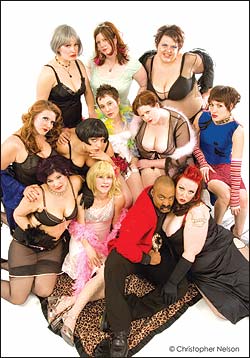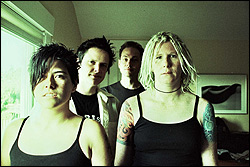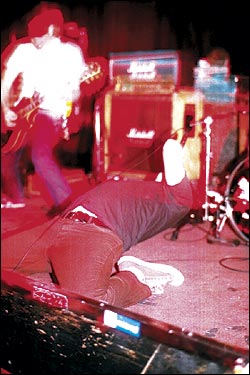During a political climate in which queer couples are camping out on courthouse steps to demand equal rights, a gaggle of hot girls peeling off wet T-shirts to the tune of “Pour Some Sugar on Me” doesn’t sound all that radical. But when the T&A in question belongs to the Queen Bees, you can bet your best set of pasties there’s significance in every shimmy and shake. Queen Bees shows, along with other unabashed displays of sexuality like Gender Explosion and the Fallen Women Follies, have created a hotbed of queer theatrics in Seattle. In small but significant ways, these performers represent the kind of activism that often gets overlooked when the queer community asks itself what’s happened to our commitment to pride, politics, and revolution. Yet, the power of performance to effect social change on multiple levels should not be underestimated—especially when it’s in the hands of the lovely ladies, bois, butches, and gender queers of Seattle’s dyke performance scene.
“It was about trying to engage people in all different ways,” says Gender Explosion founder Sara Johnston about the roots of her annual showcase, a sort of drag variety show. “[To] engage audience members in the nonprofit, but also engage them with the performers onstage, as well as to engage people in building community.”
Since its creation in 2000, Gender Explosion has raised thousands of dollars for and awareness of several nonprofits in the community, such as Home Alive (the antiviolence, self-defense project), Camp Ten Trees (a summer camp for LGBT youth and the children of queer parents), and, mostly, Northwest Network (a support group for queer survivors of abuse).
While she doesn’t necessarily see Gender Explosion as being inherently political, Johnston, a former producer of drag-king shows (she performs as Thirston W. Prescott in BoyToyz, a drag-king boy-band act), created the show in part to counter some of the disturbing sexism and racism she and others found in the drag-king world. Gender Explosion performers are required to sit down with Johnston and think through how their act might resonate politically with a diverse audience.
“When I started Gender Explosion, one of my main things was, ‘Can I create a space where we have a snapshot of liberation? Can we have a space where all genders are having fun performing—however they want and however they think—[in a manner] that relates to them respectfully, intentionally?'” says Johnston. The result was one of the first shows of its kind, bridging the often rigidly divided world of drag to feature kings, queens, femme drag queens, burlesque performers, and everyone in between doing skits, dancing, lip-synching, and a host of other performance styles.
Another local cabaret and consummate fund-raiser for nonprofits is the Fallen Women Follies, which donates proceeds to area women’s organizations, including Seattle Rape Relief (which has since closed), Angeline’s Center for Homeless Women, and Verbena, a health organization for lesbian, bisexual, and questioning women and transgendered individuals. But beyond fund-raising, these shows have also undertaken other community-building efforts. The Follies, which is female-run, has worked to change conceptions about women in the sex industry.
“I think my message to people is that women acting out their sexuality is a good thing to witness,” says Tamara Dover, aka Tamara the Trapeze Lady, the Follies’ founder. “And that if we were allowed to explore that in much safer, more socially acceptable ways, the world would be a fuck of a better place.”
Dover started the Follies in 1995 to create a venue for women in the sex industry to perform for audiences of their choosing. “My criteria back then was fallen women—which, of course, used to just mean you had sex before marriage!” she says with an easy laugh. Over the years, Dover’s concept of a fallen woman has (pardon the pun) broadened to include “any woman who feels slighted by society—for whatever reason—for whatever she’s doing.” That means strippers, lesbians, even stay-at-home moms doing burlesque, drag, belly dance, spoken word, and, in Dover’s case, the aerial arts.

Dover swings into action.
(Christopher Nelson) |
The reigning monarchs of queer political performance are the Queen Bees, a performance troupe consisting of predominantly feminine-identified queers, gender queers, and allies. Since forming in 2002, the Bees have taken aim at homophobia and heterosexism, George W. Bush, myriad forms of oppression, and body fascism. The trick behind their subversive sting, however, is that it’s infused with just the right amount of sensual sass—making their politics fun rather than preachy, sexy rather than soapboxy.
Take the aforementioned “Pour Some Sugar on Me” piece: When the average bump and grind is being done by 250-pound lesbians, skinny women without the obligatory killer rack, and gender queers, the very nature of the “girlie show” is changed. With this undeniably titillating performance, the Queen Bees are challenging their audiences, their community, and themselves to take back girl-on-girl action from leering hetero-masculinity and to redefine what and who is sexy.
“We create this world,” says Krista Smith, aka Kentucky Fried Woman, co-founder of the Queen Bees, her voice displaying just a hint of a Kentucky-fried accent. “And in our world, women of all shapes and sizes and colors are beautiful. And in our world, queer people are OK and normalized and respected and objects of love and passion. And in our shows, George Bush is defeated and does lose to the power of the people.”
This is the kind of crucial activism so much of Seattle’s dyke performance scene is engaged in—the strengthening of the community from within.
“I know that a lot of people would say that having these quirky variety shows in bars isn’t really valid [activism],” says the Follies’ Dover. “But you know what? I’ve seen that it is. In a small way, in this little community that I’m in, I have seen positive changes.”

Johnston (far left) and BoyToyz tweak gender roles.
(Loti) |
Her comment is a potent reminder that, even on a small scale, we must constantly work to overcome our own self-destructive tendencies, our own internalized oppression, in order to steel and inspire each other to fight the long line of enemies waiting outside our little worlds.
“I feel like people leave having hope, reinvigorated in their own activism and lives,” says Smith. “And for folks who aren’t activists, maybe it gives them stuff to think about.”
While they may never produce the same kind of results that down-and-dirty, street-based activism does, these artists and their shows are evidence that performance can be provocative in more ways than one.






